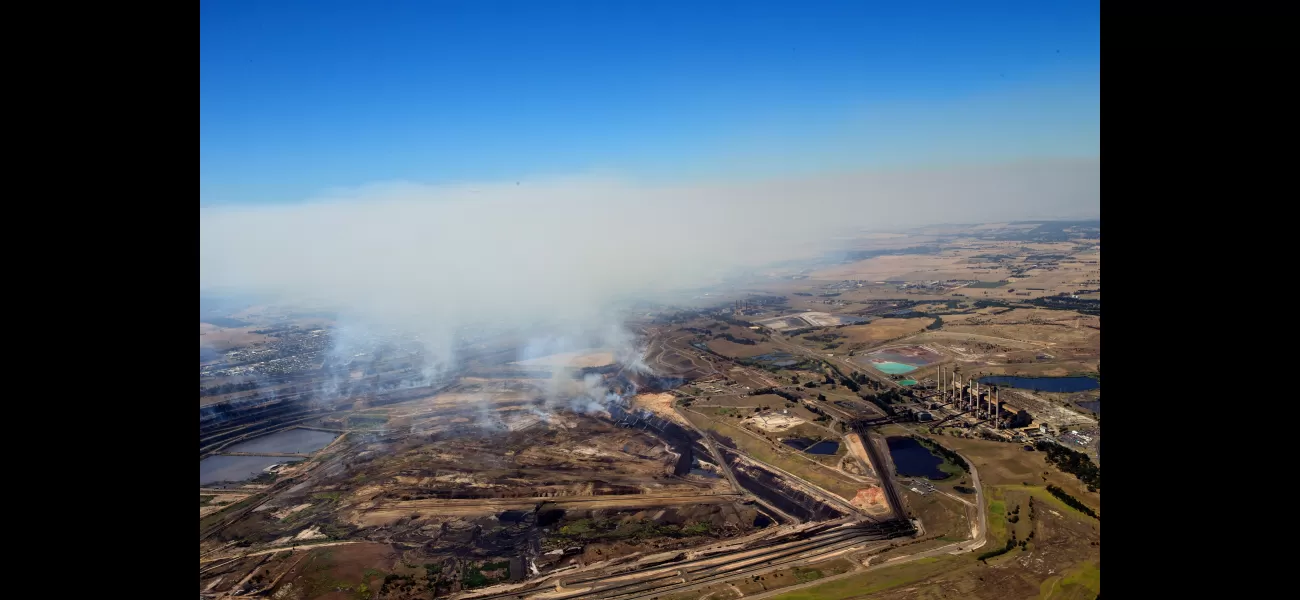Study reveals that individuals exposed to mine fire experience accelerated lung aging, equivalent to almost five years of normal aging.
Health issues lingered for years after smoke exposure, with residents experiencing chest tightness, chronic coughs, and uncontrolled asthma.
August 20th 2024.

Ten years ago, a mine fire wreaked havoc in Gippsland, leaving behind a trail of potential long-term lung damage for the local residents. The fire, which originated from the Hazelwood coal mine in 2014, engulfed the La Trobe Valley region in thick smoke for a staggering 45 days. It was a time of turmoil and uncertainty for the affected communities.
In a recently published study in the journal Respirology, researchers revealed their findings on the aftermath of the destructive fire. They collected data from approximately 500 individuals, either from the town of Morwell, which was directly impacted by the smoke, or from the nearby town of Sale, which remained unaffected. The results were concerning, to say the least.
The study showed that those who were exposed to the harmful particulate matter in the smoke had sustained damage to their lungs equivalent to 4.7 extra years of aging. This meant that their lungs had aged at an accelerated rate due to the exposure. The researchers also noted that asthmatic individuals from Morwell had poorer control over their condition compared to those from Sale. Additionally, there was a correlation between the exposure to PM2.5 and symptoms such as chest tightness and chronic cough, especially in smokers. Non-smokers also showed signs of damage to their lung function, as measured by spirometry tests.
COPD, a chronic inflammatory lung disease that obstructs airflow, was a major concern for the researchers. They emphasized that the results from their study indicated that exposure to the mine fire smoke had led to premature lung aging. However, they did acknowledge the limitations of their study, such as the lack of pre-fire lung data from the participants.
The researchers also urged for future town planning to take into account the potential health risks associated with decommissioned coal mines in the vicinity. With the increasing threat of climate change, similar events are expected to occur more frequently. It is imperative to address the health implications of such disasters in town planning to ensure the safety and well-being of the community.
In conclusion, the mine fire in Gippsland 10 years ago had a lasting impact on the residents, with the potential for long-term lung damage. The study conducted by researchers shed light on the severity of the situation and the need for proactive measures to address the issue. As we move towards a more uncertain future, it is crucial to prioritize the health of our communities in all aspects of planning and decision-making. And remember, stay updated on all the latest news and events through our WhatsApp channel – no comments, no algorithm, and your privacy is safe with us.
In a recently published study in the journal Respirology, researchers revealed their findings on the aftermath of the destructive fire. They collected data from approximately 500 individuals, either from the town of Morwell, which was directly impacted by the smoke, or from the nearby town of Sale, which remained unaffected. The results were concerning, to say the least.
The study showed that those who were exposed to the harmful particulate matter in the smoke had sustained damage to their lungs equivalent to 4.7 extra years of aging. This meant that their lungs had aged at an accelerated rate due to the exposure. The researchers also noted that asthmatic individuals from Morwell had poorer control over their condition compared to those from Sale. Additionally, there was a correlation between the exposure to PM2.5 and symptoms such as chest tightness and chronic cough, especially in smokers. Non-smokers also showed signs of damage to their lung function, as measured by spirometry tests.
COPD, a chronic inflammatory lung disease that obstructs airflow, was a major concern for the researchers. They emphasized that the results from their study indicated that exposure to the mine fire smoke had led to premature lung aging. However, they did acknowledge the limitations of their study, such as the lack of pre-fire lung data from the participants.
The researchers also urged for future town planning to take into account the potential health risks associated with decommissioned coal mines in the vicinity. With the increasing threat of climate change, similar events are expected to occur more frequently. It is imperative to address the health implications of such disasters in town planning to ensure the safety and well-being of the community.
In conclusion, the mine fire in Gippsland 10 years ago had a lasting impact on the residents, with the potential for long-term lung damage. The study conducted by researchers shed light on the severity of the situation and the need for proactive measures to address the issue. As we move towards a more uncertain future, it is crucial to prioritize the health of our communities in all aspects of planning and decision-making. And remember, stay updated on all the latest news and events through our WhatsApp channel – no comments, no algorithm, and your privacy is safe with us.
[This article has been trending online recently and has been generated with AI. Your feed is customized.]
[Generative AI is experimental.]
0
0
Submit Comment





